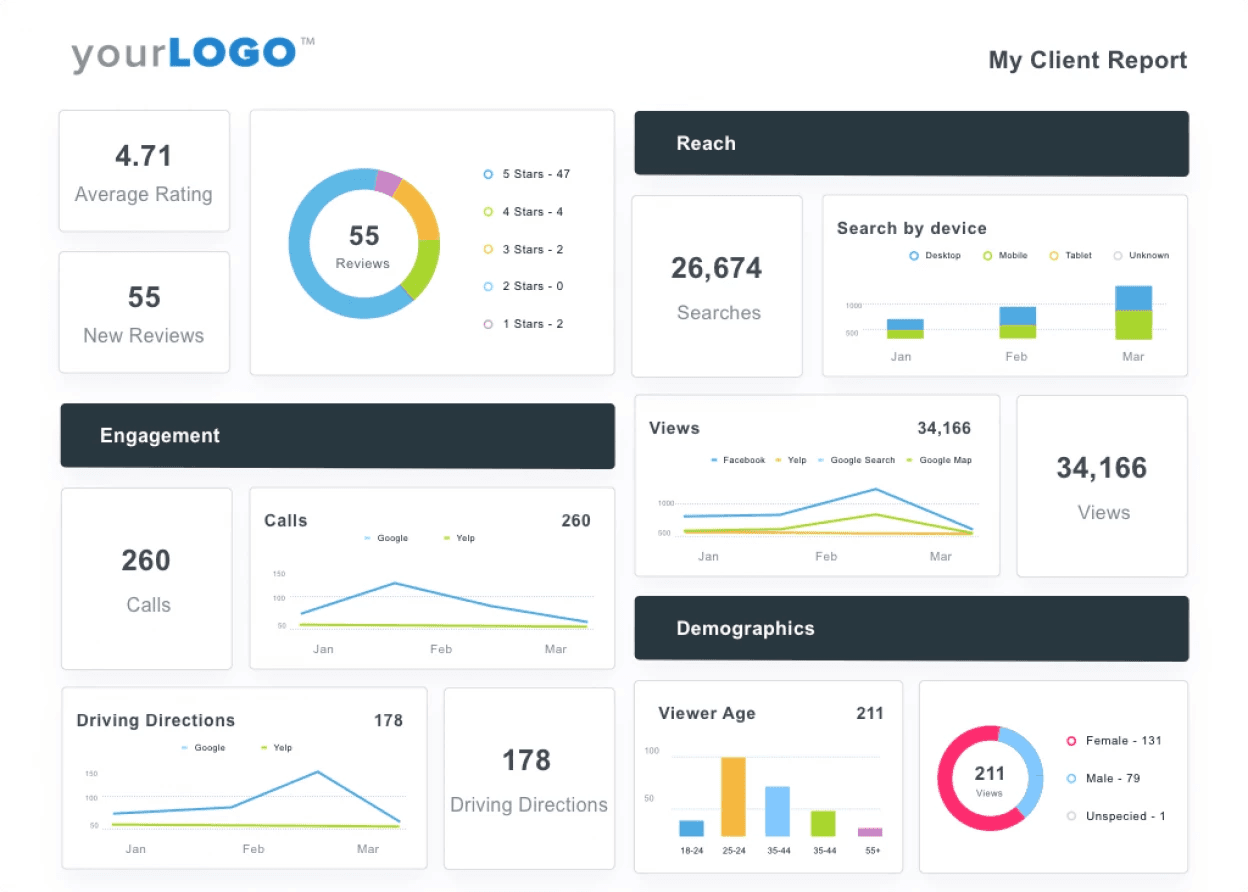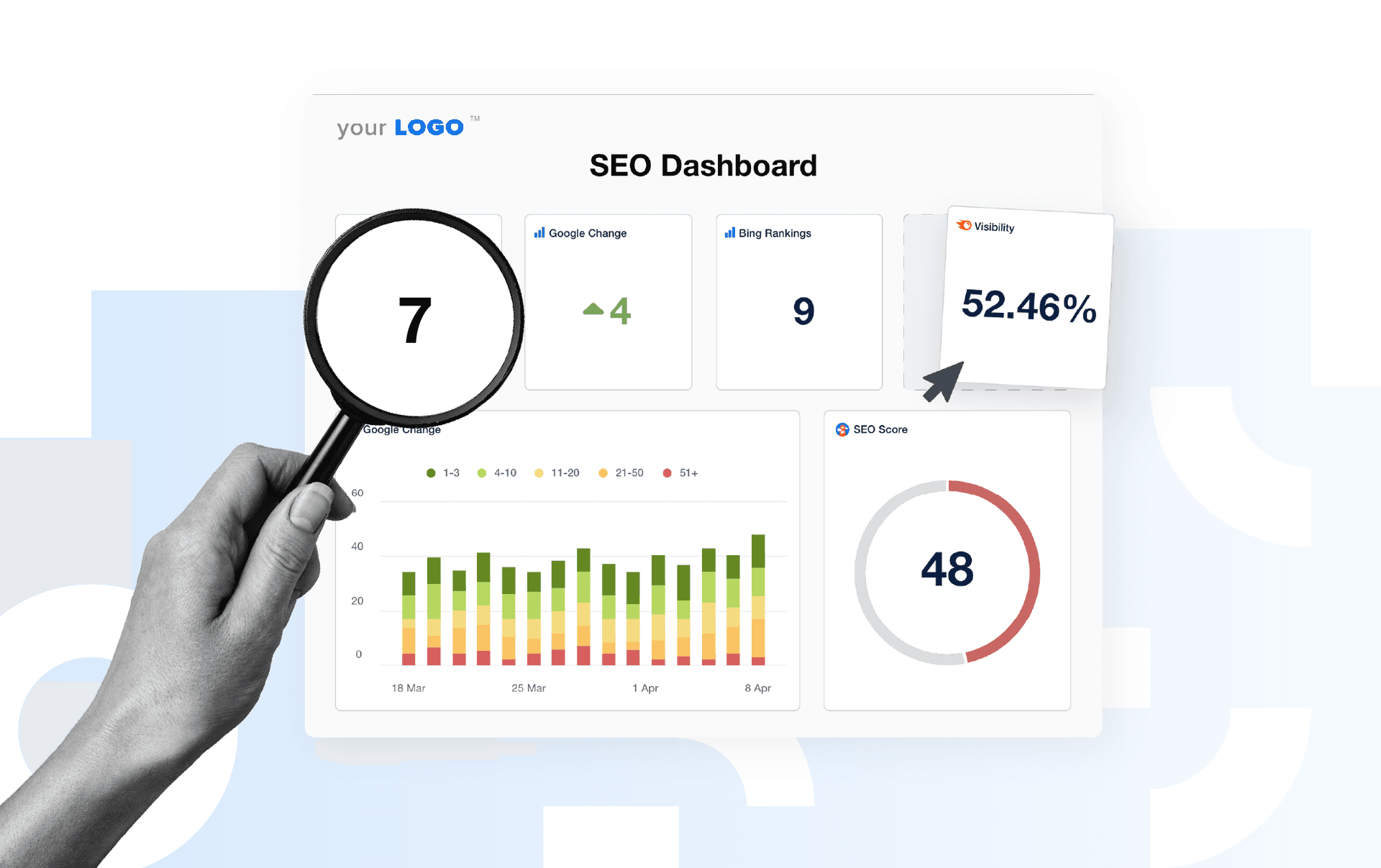Table of Contents
QUICK SUMMARY:
Dental SEO focuses on optimizing dentists' online presence to attract local patients through targeted strategies. Unlike general SEO strategies, dental SEO tailors practices for local visibility, emphasizing content that resonates with community needs and leveraging local reviews. This comprehensive guide covers everything from building a dental SEO strategy down to how to create a dental SEO report that highlights agency value.
When someone has a toothache, lost crown, or chipped tooth, you’ll want your marketing agency’s dental client to be the first thing that person sees when visiting Dr. Google.
There are a number of tactical ways to fight for those critical search result rankings, but there are no one-size-fits-all SEO strategies for all businesses, and dental SEO is no exception. To improve the ranking of a dental practice’s website, agencies need to use fine-tuned strategies to crack those top-ranking spots.
Since dental practices are local businesses, local SEO strategies can be replicated across a number of different practices, each targeting its own regions. This allows your marketing agency to expand its portfolio of dental clients using the same set of specialized techniques.
By becoming the best dental SEO expert that you can be, not only will you help your clients rank better, but your agency will also attract more clients into its portfolio, making it a win-win for everyone.
SEO for dentists is constantly evolving, and the days of keyword-filled content are long gone. Today, things like the location of your practice, nearby competitors, what your niche service is, and even your own reputation as a doctor play important factors in how (and where) you turn up in a Google search result. Your website needs to build trust with potential patients and position you as an authority in your field.
Cherie Dickey, SEO Team Lead at Smile Marketing
Explaining to Clients How Search Engines Rank Dental Websites
While the importance of SEO, in general, might be common knowledge for most businesses, the importance of dental SEO might be a bit more difficult to communicate. The typical on-page SEO practices such as the use of keywords and an optimized website are of course mandatory, but it’s important to remember that dentists work locally. A strategy for an online business or large-scale chain isn’t necessarily going to be suitable.
Being able to create content that drives traffic from local sources and highlights local voices in reviews provide a rich SEO backdrop to ensure that search engine rankings are reaching the right people, in the areas these businesses are operating.
How to Optimize a Dental Website for SEO
The right Dental SEO strategy is critical to getting any dental practice’s website to a decent ranking. These are the steps an agency can take to optimize its client’s online presence.
Let’s take a closer look at some of these steps.
Finding the Relevant Keywords for a Dental Business
Dental SEO is more than using the basic keywords of “dentist” and “toothache”. A good starting point is thinking beyond the common terms and considering what specific keywords will reflect the unique offerings of a particular practice.
Buyer-intent keywords target a specific audience that’s more likely to need a dentist’s services and are an opportunity to highlight services a practitioner specializes in. So instead of just using “dentist”, it would be better to include more specific keywords such as “family dental”, “dental surgery”, “veneers”, or “sealants”. If a practice specializes in root canals, that keyword (and semantic variations of it) should be a major part of any SEO strategy for that practice.
Finding related terms on Google is also a helpful way to find keywords connected to the ones you’re already planning on using. It refines your client’s keywords from “teeth whitening” to “professional teeth whitening”.
When Adding Keywords, Remember Local SEO
Search engines may be accessible anywhere in the world, but most dental practices are local businesses, and they need to plan locally. With that in mind, local SEO strategies are your best friend to turn your client's dental office into THE neighborhood dental office.
Nearly 92% of searches use keywords with long tails. Instead of searching for “dentist” or “sore gums”, an average search is more likely to be “closest dentist near me”, "emergency dentist weekends" or “what to do when your gums are sore”.
When considering keywords, neighborhoods or other regional identifiers are a helpful way to associate a website with terms anyone in the area might be using to find their local dentist. It’s the difference between someone searching “dentist” and “dentist in downtown Springfield”. Thousands of other practices are fighting for SEO placement in that first option, but only a few are going to appear under the second.
Another easy step is to remember to include a business’ NAP, (name, address, and phone number) on each page of its website. And this information needs to be consistent not only on your client’s website but on any business directories a practice is added to.
Google Business Profile & Local Directories
And speaking of those directories, according to HubSpot there are many to be considered, though a few basic choices include Facebook, Apple Maps, LinkedIn, and of course, a Google Business Profile. In addition to catching the eyes of anyone using these directories, it also builds links to a website, improving its SEO performance.
Dental practices in particular may need special care when being added, as their addresses may include a specific office number or numbers in a larger building. The phone number added should also be the one for public-facing contact, such as the line to a reception desk.
Also, consider that some practices have multiple locations. For all the strategies included here, a business with multiple locations will require special attention, such as including all locations under directories, using keywords for specific services where they’re available, and posting reviews that reflect the quality of service from the corresponding location.
Optimize the Website Design for Effective Dental SEO
Getting a website online is essential for most businesses these days. But, as Google pays more and more attention to user experience in its ranking algorithm, a high bounce rate could end up hurting its SEO ranking.
Performing an health check on a website’s SEO is another helpful way to measure its effectiveness. The strength of that Dental SEO can be easily measured with an SEO audit tool. These provide a site-wide audit, letting you quickly assess what improvements should be made to enhance that dentist’s presence on search engines.
A properly optimized website uses a number of techniques to keep users engaged. More than that, these improvements raise the quality of experience for anyone navigating a practice’s website.
Some of these techniques are obvious, such as a fast loading time and clean design. But some are often overlooked, such as a website’s design having a mobile-friendly layout. By the end of 2021, 63% of search engine visits in the United States were done on mobile devices.

Having a website that accommodates those users is a vital way of keeping them engaged and more inclined to explore the services being offered.And–of course–if someone is on their mobile phone looking for an emergency dentist, you don’t want them to have trouble using your client’s website.
Another essential part of any website is to include the appropriate metadata. Although metadata can be helpful when broad, a local business like a dentist might benefit more from targeted tags and descriptions that highlight the community it’s a part of. Metadata including image alt tags is also an important part of making sure that your client’s website is fully accessible. While being the authority on dental matters around the world would be nice, a more realistic and attainable goal is to make a dental practice synonymous with the area it operates within.
A Dental SEO agency should be running regular SEO audits to make sure that all of the technical aspects of the site are clean, polished, and doesn't have any cavities.

Invest in Relevant Content That People Are Searching For
A dental website should be so much more than a place to schedule an appointment or find a list of services offered. Content such as a blog offers a dental practice the opportunity to engage with potential patients directly, providing detailed answers to common questions, or offering advice on oral health at home.
By creating these pages, a website’s Dental SEO reach expands to include potential patients not only looking for a dentist at that moment but someone who might consider a dental appointment in the future. When someone is looking for answers on why they are experiencing sensitivity or how long they should be brushing their teeth, you want them to find your client.
It also helps to think locally when creating content by finding a way to connect it to local events that might remind someone of their dental health. This could include offering people some dental hygiene advice ahead of a local chocolate festival.
Another basic building block when creating content for a Dental client is an FAQ page. This should address questions someone may have about flossing, without devoting an entire page to the subject, allowing a practice to put content on its website. Over time, careful monitoring of performance metrics can reveal opportunities for more detailed content on a particular subject, such as a blog post.
An important part of any dental practice’s website & SEO strategy is to create pages with more detailed content for specific services. This also doubles as a way of expanding the impact of keywords for the types of services a dental practice offers. When searching for a dentist that offers crown repairs, the visitor is directed to a page that goes into detail about the service and why your client is an expert on it.
Get More Reviews That Highlight a Business’ Strengths
Just like the offline world, word of mouth has a huge impact on the online space. And part of improving that all-important online reputation is gathering customer reviews. When searching for their medical needs, 90% of people use online reviews.
Although reviews on Google are essential, also consider suggesting review sites that specialize in doctors and dentists, such as HealthGrades.com and Vitals.com, both of which come recommended by WebMD.
We’ve detailed the importance of reviews for local businesses in the past, and some quick strategies to get those reviews with handy reminders such as including it on an appointment card or including a clear call to action on their website.
Make sure to track those in a reviews report, so that once those reviews start coming in, your agency can proactively take some of the more glowing ones and include them on the practice’s website and social media channels.

Our ratings & reviews report makes tracking your dental client's reputation easy. Try it free for 14 days!
Sitting in a chair while someone polishes your teeth for half an hour often leads to more personal relationships, so reviews that mention a dentist’s soft skills, such as a good sense of humor or caring demeanor help highlight strengths that are more believable coming from patients.
How To Know When Dental SEO Is Working
Explaining the importance of SEO to a client is best told as a story. And that story may have a number of unexpected turns after that first step. Creating a roadmap using the techniques above isn’t a recipe for perfection, but it is a strong first step. It’s important to follow each one with a highly adaptable strategy that uses real metrics and goals to give this story a happy ending.
Using the Right Tools to Monitor Success
No SEO solution is an instant fix, but should rather be understood as a series of steps. And to explain those steps, and amend them accordingly, you need to have the right tools.
A few simple metrics include conversions, website traffic, and keyword rankings. And the performance of these metrics requires tools that track your SEO over a number of domains across time. That way more granular changes can be observed and made, such as adjusting keywords based on weekly or monthly data from search rankings. Or monitoring the impact of backlinks, allowing you to fine-tune performance to emphasize the ones that create a greater impact.
Having the right SEO reporting tools in place from the beginning offers greater insight into what works, and what doesn’t, creating flexibility to adapt to the ever-changing online landscape with a few simple adjustments. And also important is having a set of rank tracking tools that can be applied to a number of different dental practices. This can scale up one successful dental campaign into a number of successful dental campaigns without having to start from scratch each time.
Ranking tracking that clients can easily understand. I trust AgencyAnalytics more than any other rank tracker out there. It’s also easy to use and integrate with lots of other programs, such as Google Search Console and call tracking programs.

The Dental Marketing Guy
Maintaining That Success
Just like the daily work needed to maintain one’s dental health, a good dental SEO strategy requires consistent maintenance. From the daily duties of monitoring changes in performance to running an SEO site checker to find technical SEO issues to the occasional strategy shift to fix what isn’t working.
It is also important to keep an eye on the competition. Although a dental practice may rise to some prominence in its area, that doesn’t mean there won’t be other dentists using new techniques to make a name for themselves. Being able to adapt to those new competitors is essential to the long-term health of any dental practice. And that adaptation begins with keeping a close eye on what those competitors are doing.
With the AgencyAnalytics platform, track the competition to make sure that once that success is achieved, any upstarts challenging for dental SEO supremacy won’t catch your agency by surprise.
Creating a Dental SEO Machine for Your Agency
Marketing agencies should streamline their dental SEO strategy to better serve their clients and chart a successful course for onboarding new clients who own dental practices.
Every client will have unique needs, but dental practices are local businesses that offer very similar services. A keyword strategy that builds one practice’s reputation as the go-to local dentist can be repeated in different neighborhoods. And using keywords with longtails can prevent overlap, so that each practice attracts patients in their specific area.
SEO dashboards and SEO report templates are easily replicated with AgencyAnalytics for new clients, saving time and allowing an agency to scale up the number of its dental clients. Much like your clients becoming a neighborhood dentist, you can distinguish your own agency as the go-to place for dental SEO expertise, among other niches.
Agency Tip: Simplify your client reporting process with a dental marketing report template—tailored for dental practices and designed to effortlessly showcase your agency's results.
Summary & Takeaways
Any dental business easily understands the difference between a patient who flosses every day and one who only losses the day before their dental hygiene appointment. Neither is beyond help, but the ideal goal is to turn bad habits into good ones. Dental SEO is much like building those good habits, making your client's online presence the winning smile that turns their business into a success. By embracing the unique challenges of dental practices, applying a local SEO strategy, making use of targeted keywords, and creating relevant content, your agency should help position its client as their area’s destination for dental care. Creating these strategies and having the tools to demonstrate the success of your clients’ marketing campaigns will give your agency a strong portfolio to use when onboarding prospective clients–especially in the field of dentistry.

Written by
José Gonzalez is a writer and editor who specializes in bringing to life the stories of people and businesses.
See how 7,000+ marketing agencies help clients win
Free 14-day trial. No credit card required.






